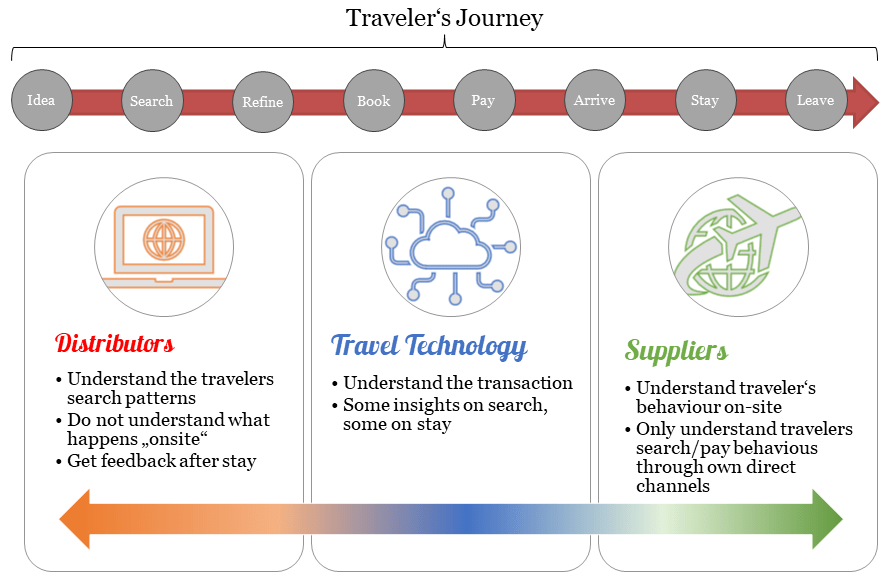Some months ago in New York (at the Skift Global Forum) I had a very interesting sit-down conversation with a CEO of a leading European online travel-agency. We opted out on the crowded event premises and instead found a nearby coffee shop for a deeper, more intimate conversation about the travel industry’s future.
When we talked about the use cases of AI/ML, and one of the promises of the technology is to “recognize” travelers more easily, he remarked that travel in past centuries probably was more “user friendly” in some ways than it is today: historic travelers enjoyed personalized attention by being recognized from the staff at the hotels: from the moment the doorman spotted the traveler arriving, continuing to one of the bell staff then accompanying them up to their room, making sure all needs and wants are to be taken care of.
However, in “modern times” we have largely strayed away from that “elegant travel theme” and have turned to something that is often portrayed by travelers felt as “anonymous/industrialized” (think of both travelers and agents glued to their screens whilst actually talking to each other).
This is experience is heavily influenced by the raise of the Internet and often feels more like an extension of E-commerce rather than a human-centric adventure. It seems we’ve prioritized efficient distribution of services over the human interactions that are at the heart of travel.
Subsequently we also discussed the “Digital Transformation” efforts to build the basis of systems fully capable running AI/ML, a discussion that went beyond the usual “well, we need more modern/faster/scalable platforms to deal with all this new fancy stuff!”.
However, before we can fully embrace “Deviceless Travel,” we must first address the preliminary steps of the “Digital Transformation” necessary for its realization. (which also will be a deciding question for many travel businesses in terms whether they will thrive, survive or perish in coming years)
Digital Transformation in Travel
Key elements of this transformation, in my view, include:
- Gaining a deep understanding of the traveler’s journey, both online and offline.
- Real-time monitoring and understanding of traveler behavior.
- Identifying and mitigating friction points promptly.
- Creating consistently superb user experiences.
- Developing and using (cloud!) scalable technologies and products to support these goals.

I participated in a panel session at the “Digital Travel Summit ” in November, where we focused on the unique challenges the travel industry faces in this regard.
Thus, when asked on what the status on “Digital Transformation” in travel companies is, compared to other industries such as Retail, Financial Services, Supply Chain, Manufacturing etc I spoke about the three main challenges where the Travel & Hospitality industry has fallen behind (btw I feel quite blessed to be a part of an organization that get great insights from many industry-verticals)
1. Future Technical Debt
The current technology state of travel industry companies is often a legacy IT stack where continuously new services are added on top over the years, often reaching the end of their lifecycle without being replaced, in many cases preventing further scalability and also finally creating major headaches around system stability.
To explain this a bit better to non-technical people:
- Think of the IT system like being a giant “Jenga Tower” game
- The “bricks” are being simply pieces of software who keep the whole thing standing (“running”)
- In the classical Jenga game the challenge is to pull out pieces at the bottom, waiting until until the tower tumbles over, kids screaming in delight…
- With your companies IT “Jenga” tower though those pieces not only get pulled out at various places, but often new pieces (“services”) get added on top or get added in
- Also, some pieces of that tower simply crumble over time (even sometimes unnoticed). “Crumbling” is akin to outdated software that is not functional anymore with the other “pieces” in the tower
This leads to the following results:
- In the wrong moment the “Jenga tower” might lose its balance (that is what you experience as an “system outage“)
- And if too many things keep get pulled out, and some crumble on the spot, the tower might collapse altogether (“major system outage“)

This now poses the immense challenge to IT leaders either having to decide to
- “Re-facture services”
(exchange the crumbling “Jenga” pieces with a new ones, to make the tower more stable which has to be done with uttermost carefulness; its not always clear if the new piece will work as intended) - “Re-platform services”
(start to build a complete new “Jenga” tower right next to the old, which is more stable and can reach different heights, a.k.a. “scalability”. The new tower can get some pieces of the old although “fresh” new pieces are a better choice) - “Do nothing”:
And take the risk of the “Jenga” tower either not being able to be built anymore higher or become unstable through crumbling pieces – and one day risking a sudden complete catastrophic collapse…
Thus leaders are forced to take a decision today about this “future technical debt” coming tomorrow.
Now, tech leaders cannot simply bypass or delay this decision – as without it the next two steps are simply not possible!
2. True platforming, end-to-end, online and offline
Another challenge is achieving true end-to-end service integration, both online and offline. The travel industry’s segmented nature often prevents a cohesive view for any of the 3 different areas of travel (Suppliers, Distributors and Travel Technology), for each mainly seeing the part of the picture which they control, but often being in the dark on what is going on in other parts of the “Travelers Journey“.

This stands in contrast to industries like Retail or Supply Chain Management where efforts are increasingly focused on the “real time” view of what is going on. Especially the “offline” part still presents a major challenge to the Travel & Hospitality industry – whilst those other industries have embraced IoT environments, the travel industry has only begun to embrace that “last leg of the journey”.
But why is this so important? IMHO it will create a paradigm shift, from today‘s analysis mostly being focused on “historical data/events“, which is reviewed via set algorithms, to a future “real time interpretation” where analysis is conducted on the spot by flexible AI/ML models, them instantly amending rules/algorithms accordingly and creating a micro-granular course of action (something I would call “hyperpersonalisation on the fly“).
(Note: “Digital Twins” has also being named as the encompassing IoT technology also in this year’s Skift report on “The Promise of Travel in the Age of AI“; “Digital Twins for Travel & Hospitality” is also a core initiative which we are working on here at Intellias, hence my profound interest on this major step)
3. The human factor in travel as the special centerpiece
Let us face it: going out on the road is often connected to stress, and that a lot of that stress comes from the “fear of the unknown“. When you are out there, you rely on the professionalism of a LOT of folks to get you safely from A to B and back: Be it the taxi driver, who understands the city around him like his pocket; the pilots in front of that flying piece of fragile metal you sit in; the staff at the hotel making sure you get the right room at the right time and also kindly give you directions where you need to go…
Thus “the human factor” is not something that simply can be “optimized away” with usage of more automation, AI-interaction, self-service and improved conversion funnels – its actually an essential part of the travel experience that makes the journey both safe and so enjoyful.
The role of technology IMHO is thus to remove all the “clutter” that stands in the interaction between the traveler and the travel industry employee, automatically removing friction-points in the background so that they can focus on what is the best part of the experience for BOTH the traveler and the employee: “Thank you TRULY I had a wonderful stay/journey/trip/experience with you!!!“. No machine can take that trust part of an human-to-human interaction away and we should build around it, instead of trying too find short cuts through it.
To sum all three areas above up:
The role of technology in travel is that unseen factor and optimizes the interaction between traveler and travel company employee. It is of essence that any obstacle, friction-point or distraction is to be eliminated to create such a joyful experience that the traveler always would want come back again, looking to re-live that same experience, and new obstacles are removed automatically by smarter, self-learning technology
Once all of this in place, the travel industry is poised to take that next big step – let’s then take a look into the future on how this could look like:
Deviceless Travel
One thing has also become clear in last years: the reliance on mobile technology has merely shifted anxieties rather than resolving them. Mobile travel apps and technology was praised as the one tool to fix that all, but in reality we just switched from “Did I bring all the right printouts?” to “Is the battery still full? Can I download the ticket? Why does the ticket now show…?“.
The reality of any travel is us still nervously fumbling a heartfelt 1000-times on their phone for the boarding card, fear of the blocked app because of the missing last update, a “numbers game” of which reservation number in the hotel might be the right one or finally an “Inner-city Restaurant Marathon” to find the best dinner location via Google Maps.
Now, that does not mean mobile apps do not work, of course they do!! (…most of the times, right?). But ask yourself: Is this really enjoyable all the time? No, absolutely not. Its time consuming, nerve-wrecking and full of broken bits of the journey, where technology could just hold such a bigger promise to help, and not obstruct (Hands-up please from the readers who honestly have been wanting to frisbee-toss their mobile device at one time or another in the past when traveling…yep, I know and feel you 😉
Digital Purist Traveler
The essence of the human race is overcoming obstacles and inconveniences, since thousands of years – and I do not think it will be any different in this case. Thus, it is my firm belief that in 5-10 years a new class of traveler, we shall call him “The Digital Purist Traveler“, shall emerge.
Her/He is an absolute “purist” in the sense that her/he tries to reduce the carried technical devices to almost zero, only “carries” the clothes that she/he is wearing on this body and lets technology around her/him take care of anything else (And yes, I do also mean clothes: Her/He will pick up clothes as recommended per AI on the fly and return them via Circular Economy).
In short, for some it might become an absolute art form to free oneself from anything, any device that could be an unpleasant distraction or a friction in the travel experience itself.
How would this be technically achieved?
- “Purists” would be mainly banking on a fully IoT integrated journey, where identification (mainly via facial recognition, but also via voice) would be handed from IoT device to IoT device
- This would be a conscious opt-in process, often accompanied by “Super Traveler ID” program who interacts with devices along the way (NeoKe is an example of such an effort)
- A big part of the IoT connected devices is AI which communicates (yes, that can mean “talk” but also other ways) to you while your are traveling; those AI get their input by being connected via visual/audio/spatial sensors of the IoT devices
- Below an idea on how such a “Purist” journey would look like
- At home the “Purist” would talk to his home-based AI and tell it “I want to be in New York by tomorrow afternoon – and will leave now“
- A taxi gets ordered for her/him and the journey would start with a facial recognition/voice recognition given
- On the way to the airport the AI organizes further details in the background: flight booked (also connecting flights), hotel booked, transfer options, dinner reservations based on profile etc
- At the terminal the traveler gets out of the vehicle (the taxi already took him to the right terminal, on a display he could see the airline/gate); when he enters the terminal he will see specific information for him (actually that is already in place via Delta Airlines “Parallel Reality”) and just walks easily all the way to the gate (or gets a great lounge offer)
- She/He bords the plane, gets his seat, his favorite streaming series is loaded or a piece of “Digital Paper” is given for “working”
- Getting off the airplane, the same applies: her/his bags are already placed in the ordered (self-driving) taxi
- Upon entering the hotel, the traveler calmly strolls over to the elevators and then gets directed to two room options on the way up (one will be an upgrade which could be check out) and in the room will find his usual temperature/stream-series etc (and also a robotic service will deliver his favorite drinks/snacks to the minibar in 10mins after arrival
- His home (or embedded) AI continues with planning scenarios (“Too tired? lets cancel dinner and order favourite delivery dish instead“) and clothing for the night/next-day will be delivered on the spot
How would “non-purists” travel?
They certainly would not go to the lengths of “purists” but still have a very “reduced” and “subtle” set of devices with them – and when people will look back the pure idea of carrying around a clumsy “phone” device will almost be comical…
Those “devices” would certainly have their own “Edge AI” model integrated (Note: “Edge AI” is a fully integrated AI in a device, that can function on its own and does not need a central server, for example like ChatGPT needs today). Some examples would be:
-
A slim Moleskine-type notebook where you can write on flexible high-tech “paper” which allows display of files, mail, apps and only appears up to facial/voice recognition
-
Sunglasses with fully embedded Edge AI which communicates with other AIs over air-interfaces and displays augmented reality information (Note: the glasses still need to be charged, likely some high-end photovoltaic cover layer on the glass itself would provide that)
- Jewelry who have integrated bio-sensors, to check your state of emotional being and are connected to your glasses/Moleskine’s AI, in order to give recommendations on what would be a good next option (“You are tired, right? There is a great coffee shop only 5mins away“)
- The external AI embedded systems will interact with your AI, to provide it that quick info and guidance – example: you know your kid loves a certain toy, the AI will communicate with others to point out that its on sale at a certain airport duty-free shop
- Travel budgets will become more flexible, AI will pick spending based on how your day went and what mood/need your are in. You will get preview options which then dynamically arrange other options of your trip
Truth to be told: a lot of the above still sounds a bit ambitious
Truth also to be told: much of the necessary technology already exists. It’s just a matter of integration and refinement.
Consequently, I am convinced that we are on the cusp of an exhilarating new era in travel, emerging from the challenging Covid years. With the integration of AI and technology, we’re moving towards a remarkably seamless travel experience.
This evolution will significantly enhance our enjoyment of travel, allowing us to fully engage with its fundamental joys: exploring new places, experiencing diverse cultures, and forging connections with people around the world, thereby making travel more enriching and meaningful than ever before.





1 Comments
Pingback: The Evolution of AI: Hoplites, Centurions and Napoleon